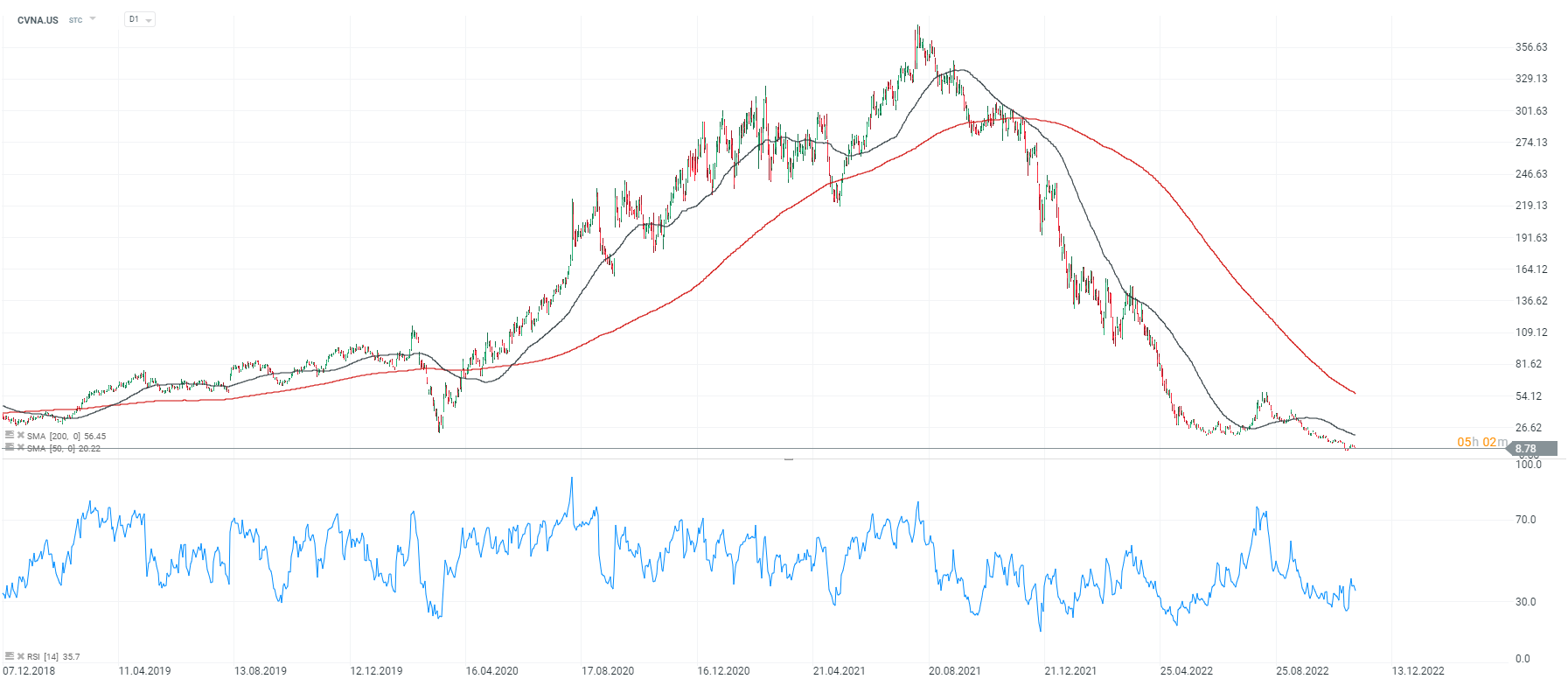Shares of Carvana (CVNA.US), until recently still the fastest growing used car sales platform in the US, are under pressure today, losing nearly 13%. The stock has lost nearly 96% since the beginning of the year amid significant debt, rising interest rates and decelerating sales. U.S. used car sales fell by about 13% year-on-year in the third quarter of 2022, which is reflected in the company's results. Huge declines were also reported today by 'second-hand' auto parts supplier Advance Auto Parts (AAP.US):
- Carvana reported a drop in sales in the third quarter to $3.4 billion from $3.5 billion in the third quarter of 2021. Wall Street had expected results of $3.7 billion;
- According to FactSet, the company has between $6 billion and as much as $7 billion in debt and no cash on its balance sheet. The company also still does not have positive cash flow. Net debt relative to cash on the balance sheets of non-bank companies in the S%P500 index is on average double that of Carvana;
- On Tuesday, analysts at Oppenheimer downgraded the car dealer's stock from Buy to Hold, despite a nearly exponentially declining valuation. The analysts cited significant operational and financial risks in the short term as most relevant to the company's stock price.
- The company, despite the proposal, did not respond to the analysts' assessment. In September, Oppenheimer analysts' target price was $51; today the stock is worth less than $9;
- Carvana's management sees some weakness in the used car market. In August, as interest rates rose and demand for used cars weakened, Carvana set a goal of generating positive free cash by cutting costs so that the company could finance itself without the need for additional debt or equity;
- Cavana did not achieve its goals. The company again used nearly $200 million more in cash than it expected. Wall Street does not project full-year positive free cash flow until 2026;
Used car demand in face off implosion?
JP Morgan analysts pointed out that Carvana is still a long way from recovery because even if the industry reaches its price bottom, analysts still do not see significant potential for a rebound and a quick return to upward trends. Last week, Morgan Stanley also withdrew its recommendation along with its price target for the company. The analysts cited a deteriorating used car market and a volatile financing environment. The market for used car dealers, including Carvana, is getting tougher and Wall Street does not see the potential for a significant change. In an environment of more expensive credit, higher fuel prices and inflation eating away at savings, consumers are clearly slowing their buying tendencies. On the other hand, we can expect that if the company survives the hard times without going bankrupt it could be better viewed by the market. This probably won't happen quickly, and the Fed's path to its 2% inflation target may prove harder. Once inflation falls significantly and hawkish sentiment passes, buying trends will likely slowly begin to recover.
 Carvana (CVNA.US) shares chart, D1 interval. Source: xStation5
Carvana (CVNA.US) shares chart, D1 interval. Source: xStation5

Market wrap: European indices attempt a rebound after Wall Street’s record selloff 🔨

Morning wrap: Tech sector sell-off (06.02.2026)

Amazon shares tumble 10% as investors recoil at the price of AI dominance

Disaster for Volvo shares. Is this the end of an iconic brand?
The content of this report has been created by XTB S.A., with its registered office in Warsaw, at Prosta 67, 00-838 Warsaw, Poland, (KRS number 0000217580) and supervised by Polish Supervision Authority ( No. DDM-M-4021-57-1/2005). This material is a marketing communication within the meaning of Art. 24 (3) of Directive 2014/65/EU of the European Parliament and of the Council of 15 May 2014 on markets in financial instruments and amending Directive 2002/92/EC and Directive 2011/61/EU (MiFID II). Marketing communication is not an investment recommendation or information recommending or suggesting an investment strategy within the meaning of Regulation (EU) No 596/2014 of the European Parliament and of the Council of 16 April 2014 on market abuse (market abuse regulation) and repealing Directive 2003/6/EC of the European Parliament and of the Council and Commission Directives 2003/124/EC, 2003/125/EC and 2004/72/EC and Commission Delegated Regulation (EU) 2016/958 of 9 March 2016 supplementing Regulation (EU) No 596/2014 of the European Parliament and of the Council with regard to regulatory technical standards for the technical arrangements for objective presentation of investment recommendations or other information recommending or suggesting an investment strategy and for disclosure of particular interests or indications of conflicts of interest or any other advice, including in the area of investment advisory, within the meaning of the Trading in Financial Instruments Act of 29 July 2005 (i.e. Journal of Laws 2019, item 875, as amended). The marketing communication is prepared with the highest diligence, objectivity, presents the facts known to the author on the date of preparation and is devoid of any evaluation elements. The marketing communication is prepared without considering the client’s needs, his individual financial situation and does not present any investment strategy in any way. The marketing communication does not constitute an offer of sale, offering, subscription, invitation to purchase, advertisement or promotion of any financial instruments. XTB S.A. is not liable for any client’s actions or omissions, in particular for the acquisition or disposal of financial instruments, undertaken on the basis of the information contained in this marketing communication. In the event that the marketing communication contains any information about any results regarding the financial instruments indicated therein, these do not constitute any guarantee or forecast regarding the future results.


